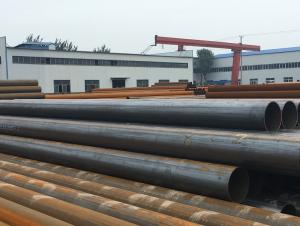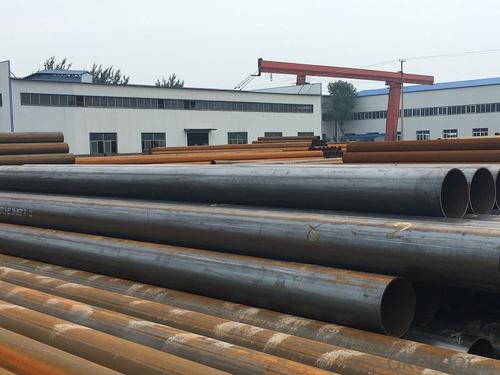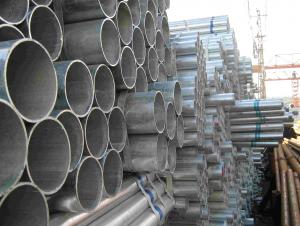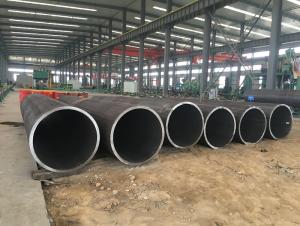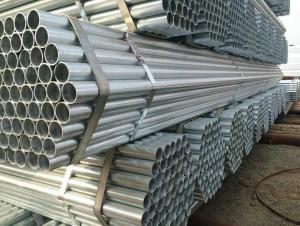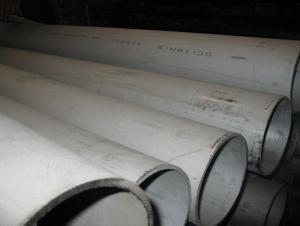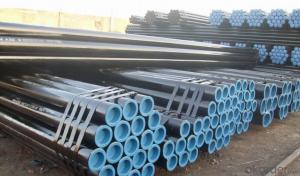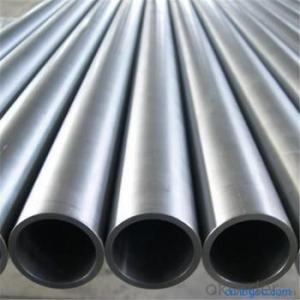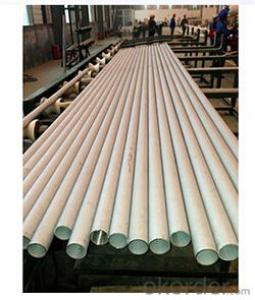Seamless Steel Pipe for high pressure fluids
- Loading Port:
- Tianjin
- Payment Terms:
- TT or LC
- Min Order Qty:
- 15 m.t.
- Supply Capability:
- 16000 m.t./month
OKorder Service Pledge
OKorder Financial Service
You Might Also Like
1、Structure of Seamless Steel Pipe for high pressure fluids
Seamless pipe is formed by drawing a solid billet over a piercing rod to create the hollow shell. As the manufacturing process does not include any welding, seamless pipes are perceived to be stronger and more reliable. Historically seamless pipe was regarded as withstanding pressure better than other types, and was often more easily available than welded pipe.
2、Main Features of Seamless Steel Pipe for high pressure fluids
• High manufacturing accuracy
• High strength
• Small inertia resistance
• Strong heat dissipation ability
• Good visual effect
• Reasonable price
3、Seamless Steel Pipe for high pressure fluids Specification:
Standard | GB, DIN, ASTM ASTM A106-2006, ASTM A53-2007 |
Grade | 10#-45#, 16Mn 10#, 20#, 45#, 16Mn |
Thickness | 8 - 33 mm |
Section Shape | Round |
Outer Diameter | 133 - 219 mm |
Place of Origin | Shandong, China (Mainland) |
Secondary Or Not | Non-secondary |
Application | Hydraulic Pipe |
Technique | Cold Drawn |
Certification | API |
Surface Treatment | factory state or painted black |
Special Pipe | API Pipe |
Alloy Or Not | Non-alloy |
Length | 5-12M |
Outer Diameter | 21.3-610mm |
Grade | 20#, 45#, Q345, API J55, API K55, API L80, API N80, API P110, A53B |
Standard | ASME, ASTM |
1) Material:20#(ASTM A 106/A53 GRB.API5LGRB,GB),45#,16Mn,10#.
2) Specification range:OD:21.3-610mm,WT:6-70mm,length:6-12m or according to the requirement of clients.
3) Excutive standards:GB,ASME API5L.ASTM A 106/A53,Despite of the above standards,we can also supply seamless steel pipe with standard of DIN,JIS,and so on,and also develop new products according to the requirements of our clients!
4) Surface:black lacquered,varnish coating or galvanized.
5) Ends:Beveled or square cut,plastic capped,painted.
6) Packing:bundles wrapped with strong steel strip,seaworthy packing.
4、Packaging & Delivery
Packaging Details: | seaworthy package,bundles wrapped with strong steel strip |
Delivery Detail: | 15-30days after received 30%TT |
5、FAQ of Seamless Steel Pipe for high pressure fluids
①How is the quality of your products?
Our products are manufactured strictly according to national and internaional standard, and we take a test
on every pipe before delivered out. If you want see our quality certifications and all kinds of testing report, please just ask us for it.
Guaranteed: If products’ quality don’t accord to discription as we give or the promise before you place order, we promise 100% refund.
Why should you chose us?
Chose happens because of quality, then price, We can give you both.Additionally, we can also offer professional products inquiry, products knowledge train(for agents), smooth goods delivery, exellent customer solution proposals.Our service formula: good quality+good price+good service=customer’s trust
SGS test is available, customer inspection before shipping is welcome, third party inspection is no problem.
6、Seamless Steel Pipe for high pressure fluids Images:
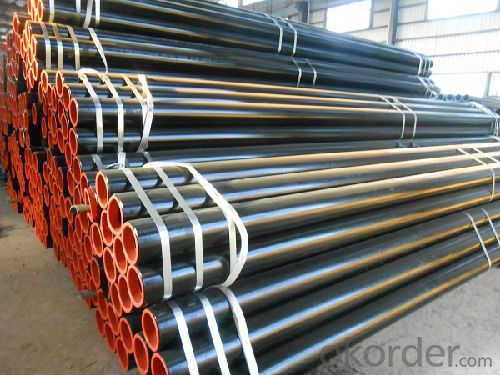
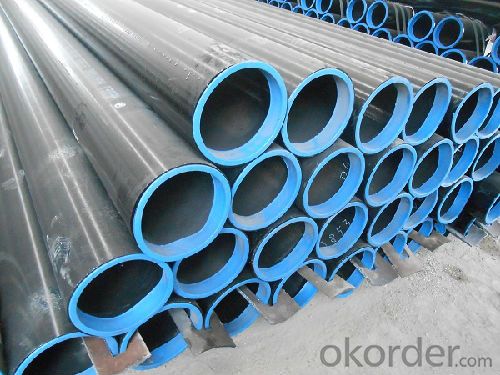
- Q: How are steel pipes used in tunnel construction?
- Steel pipes are used in tunnel construction as structural elements to provide support and stability to the tunnels. They are commonly used in tunnel lining systems to create a strong and durable structure that can withstand the pressure and weight of the surrounding soil or rock. Steel pipes are also used for ventilation systems, drainage systems, and for carrying utilities such as water, gas, or electricity through the tunnel.
- Q: How are steel pipes used in the manufacturing of automobiles?
- Due to their strength, durability, and versatility, steel pipes find widespread use in the manufacturing of automobiles. Throughout the automobile manufacturing process, various applications make use of steel pipes. One primary application of steel pipes in automobiles lies in constructing the vehicle's chassis and body. Structural components, such as steel pipes, provide the necessary strength and rigidity. With the ability to be bent, shaped, and welded, steel pipes prove to be an ideal choice for automotive purposes. Additionally, steel pipes play a crucial role in the exhaust system of automobiles. Responsible for guiding and redirecting exhaust gases away from the engine, steel pipes form the exhaust manifold. They also contribute to the exhaust pipes and mufflers. Steel's high temperature and corrosion resistance make it suitable for enduring the harsh conditions of the exhaust system. Moreover, steel pipes serve in the cooling system of automobiles. They facilitate the transportation of coolant from the engine to the radiator and back, effectively regulating the engine's temperature. Due to their ability to handle high pressure and temperature, as well as their resistance to corrosion and chemical damage, steel pipes remain the preferred choice for this application. Furthermore, steel pipes find usage in the fuel system of automobiles. They ensure a consistent and reliable supply of fuel by transporting it from the tank to the engine. Steel pipes are selected for this purpose because of their resistance to corrosion and their ability to withstand the high pressure and temperature associated with fuel transportation. In conclusion, steel pipes are indispensable in automobile manufacturing. They contribute significantly to the construction of the chassis and body, the exhaust system, the cooling system, and the fuel system. Thanks to their strength, durability, and versatility, steel pipes are the preferred choice for various automotive applications.
- Q: Are steel pipes suitable for use in sewage treatment plants?
- Yes, steel pipes are suitable for use in sewage treatment plants. They are durable, strong, and resistant to corrosion, making them ideal for handling the harsh environment and corrosive substances found in sewage treatment plants. Steel pipes also offer excellent flow characteristics and can withstand high pressure, making them reliable for transporting wastewater and sewage within the facility.
- Q: What are the different types of joints used to connect steel pipes?
- There are several types of joints commonly used to connect steel pipes, including threaded joints, welded joints, flanged joints, and grooved joints.
- Q: How are steel pipes insulated for thermal efficiency?
- Steel pipes are insulated for thermal efficiency by adding a layer of insulation material around them. This insulation helps to reduce heat transfer through the pipes, preventing energy loss and maintaining the desired temperature.
- Q: What quota should be installed for heating seamless steel pipe?
- Should be in low carbon steel welding installation set industrial pipeline engineering quota, material to input the name and type of seamless steel pipe specifications and price; according to the description of the contents of related items can be set.
- Q: Can steel pipes be used for conveying hydraulic fluids?
- Indeed, hydraulic fluids can indeed be conveyed using steel pipes. The reason behind this lies in the fact that steel pipes possess remarkable tensile strength and are highly resistant to intense pressure, rendering them ideal for hydraulic purposes. They are capable of enduring the frequently encountered high pressures and temperature fluctuations within hydraulic systems. Moreover, steel pipes boast longevity and durability, guaranteeing dependable and efficient fluid transmission in hydraulic systems. Nevertheless, it is crucial to verify the compatibility between the steel pipes employed and the particular hydraulic fluid being conveyed, in order to prevent corrosion or deterioration of the pipe material.
- Q: How are steel pipes classified based on their diameter?
- Steel pipes can be classified based on their diameter into various categories. The most common classification system for steel pipes is based on the nominal pipe size (NPS). NPS is a North American set of standard sizes that are used to designate the diameter of a pipe. It is expressed in inches and represents the approximate inside diameter (ID) of the pipe. Steel pipes are typically classified into three main categories based on their diameter: small bore, medium bore, and large bore. Small bore pipes typically have NPS of 2 inches and below, medium bore pipes have NPS between 2 and 24 inches, and large bore pipes have NPS greater than 24 inches. In addition to the NPS classification, steel pipes can also be classified based on their actual outside diameter (OD). This classification is used to determine the compatibility of pipes with fittings and other components. The OD classification is usually expressed in inches or millimeters. Overall, the classification of steel pipes based on their diameter provides a standardized system for easy identification and selection of pipes for various applications. It helps in ensuring compatibility, efficient installation, and effective functioning of piping systems in different industries such as construction, oil and gas, plumbing, and more.
- Q: Can steel pipes be used for paper mills?
- Yes, steel pipes can be used for paper mills. Steel pipes are often used in paper mills for various applications such as transporting water, steam, chemicals, and pulp. They are preferred for their durability, resistance to corrosion, and ability to handle high pressure and temperature conditions commonly found in paper mill operations.
- Q: What is a tight steel tube?
- The tight steel tube is called "galvanized steel pipe with sleeve connection" or "flat pipe of steel metal for electrical installation". JDG. The utility model relates to a novel protective conduit for an electric circuit. The connecting sleeve and the metal accessory are provided with a wire pipeline composed of screw fastening connection technology, and the utility model does not need to do cross grounding, welding and covering, and the appearance is silvery white or yellow.
Send your message to us
Seamless Steel Pipe for high pressure fluids
- Loading Port:
- Tianjin
- Payment Terms:
- TT or LC
- Min Order Qty:
- 15 m.t.
- Supply Capability:
- 16000 m.t./month
OKorder Service Pledge
OKorder Financial Service
Similar products
Hot products
Hot Searches
Related keywords
